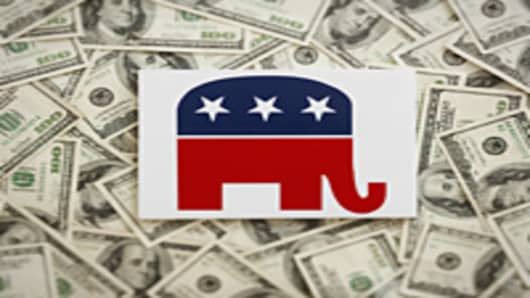Paul Krugman points out that there is good evidence that Republicans don't really care much about the federal deficit.
The GOP "is not now, and never has been (at least not since the 1970s) concerned about the deficit. All the fiscal posturing of the last couple of years has been about using the deficit as a club to smash the welfare state, with the secondary goal of frustrating any efforts on the part of the Obama administration to help the struggling economy," Krugman writes.
This strikes me as partly true. Intelligent Republicans understand that it isn’t the size of the budget deficit that effects the economy.
It’s the level of spending at which the balance occurs.
Republicans in the 1970s were obsessive about balanced budgets. Under the tutelage of Jude Wanniski and other supply-siders, they lost their infatuation with balanced budgets and embraced a new role as the tax-cut party.
Here’s a 1997 article by Walter Wriston, the former chief executive and chairman of Citicorp, and Charles Wolf, then dean of the Rand Graduate School of Policy Studies that encapsulates the Republican view on deficits since the Reagan era:
One vital fact ignored by the budget balance — one that does have great significance for the economy's overall performance — is the level of spending at which the balance (or deficit) occurs. For example, a budget deficit incurred at a spending level that represents a relatively modest (by modern standards) share of gross domestic product, say 30% (the U.S. level), may be a much more favorable economic indicator than a budget balance at a spending level that is a much larger share of the GDP, say 45% or 50%, as is the case in most European economies.
In other words, it’s the level of spending—not the deficit—that matters.
Unfortunately, many of those same Republicans also lost their passion for reducing the role of government in our lives. It was as if the absence of budgetary constraints meant that there was no reason for the government to remain severely limited in its activities.
Now the idea of budget constraint is making a comeback among Republicans. And this is where Krugman is wrong. Many House Republicans are genuinely concerned about budget deficits. They are so concerned, in fact, that they are putting their status as the tax-cutting party at risk by pondering raising payroll taxes back up to their pre-economic crisis levels.
This might be a crazy thing to do. But it isn’t the cynical move Krugman thinks it is.
Questions? Comments? Email us atNetNet@cnbc.com
Follow John on Twitter @ twitter.com/Carney
Follow NetNet on Twitter @ twitter.com/CNBCnetnet
Facebook us @ www.facebook.com/NetNetCNBC



